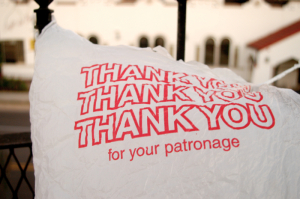Ban on plastic bags considered for Westchester
You won”™t be asked, “Paper or plastic?” at the supermarket register in Westchester County if a proposed law banning plastic bags gets through the Board of Legislators.
County Legislator Catherine Parker, D-Rye, recently introduced a bill that would prohibit retailers in Westchester from providing shoppers with a plastic bag at the point of sale. It also would require that paper bags contain no old-growth fiber, contain a minimum of 40 percent recycled content and be recyclable. Catherine Borgia, D-Ossining, MaryJane Shimsky, D-Hastings, and Peter Harckham, D-North Salem, are co-sponsors of the bill.
“The real goal of the legislation is to get people to bring reusable bags,” Parker said. She compared the legislation with other measures aimed at changing behavior, such as seat belt laws. “It does help to reinforce and expedite the public”™s change of habit.”
A similar ban took effect in the city of Rye in May 2012. Parker, at the time, was a member of the Rye City Council, though she did not introduce the bill. Currently, plastic bags are banned in the city of Rye and the villages of Mamaroneck, Larchmont and Hastings-on-Hudson, but the Hastings-on-Hudson ban has been challenged in court.
Parker said she sees the ban in Rye as a success.
“Consumers, when they shop in our community, they get it. They understand the environmental effect,” Parker said. She noted that Rye still has a grocery store, and another on the way, and thus feels that there hasn”™t been a negative effect on business.
At the supermarket, however, plastic bags are often preferred by customers.
“The plastic versus paper bag debate has been around for a long time,” said Stew Leonard Jr., president and CEO of Stew Leonard”™s, which operates one supermarket in Yonkers and three in Connecticut.
“We need to get people to recycle more and be conscious of what they”™re using,” Leonard said. “That”™s where the reusable bags come in. If we could get more customers to bring bags back to the store and reuse them, that”™s the ”˜secret sauce”™ in all of this.”
Leonard, whose family has been in the industry since the late 1960s, said his company has done market research that shows consumers prefer plastic bags.
“We offer both, but nine out of 10 of our customers prefer plastic,” Leonard told the Business Journal. “Paper rips. We have lots of fresh, perishable items, and when they”™re in paper bags, the bags can get wet and they rip.”
One industry group, the New York Association of Convenience Stores, says a plastic bag ban would have a detrimental effect on its members”™ businesses.
“Convenience store purchases are often unplanned,” said Jim Calvin, the president of the trade group. “We understand the concern about littering with plastic bags, but that”™s a littering problem. You shouldn”™t solve a littering problem by inconveniencing customers.”
The issue should be looked at from all angles, Leonard said.
“There”™s a lot of debate, but the plastic bags leave a smaller carbon footprint,” Leonard said. “But at the same time, we don”™t want to see plastic bags in our rivers and streams.”
In addition to plastic bags, Parker”™s proposed legislation would also prohibit the use of expanded polystyrene food containers. Excluded from the ban would be plastic bags larger than 28 by 36 inches, dry cleaning bags, produce bags and expanded polystyrene used to package raw meats, fish and poultry sold from a butcher”™s case.
First-time offenders would see fines of $250, with subsequent violations earning a $500 fine. The law would be enforced by the Westchester County Department of Consumer Protection.
Such a ban, Calvin said, would further stifle convenience stores, for which hot coffee is a major item. Additionally, convenience stores have been recently expanding into the prepared food market and often use expanded polystyrene containers.
“I”™m just not sure that a satisfactory substitute is available,” said Calvin, whose organization represents the owners of more than 1,600 convenience stores statewide. “You need something that will keep hot and cold, won”™t droop and won”™t feel hot in a customer”™s hand. It would really put convenience stores in a bind.”
Leonard said his stores package prepared foods in recyclable plastic rather than expanded polystyrene foam containers.
“We recycle a ton of plastic a week ”“ 52 tons a year. We have a big emphasis on that,” Leonard said. “The best thing would be to get customers to bring the bags back. We have bins for that in all of our stores.”
Leonard said he thinks that before making a decision, the legislature would be well served to take a hard look at the issue. “I think the best thing for the legislators is to get someone in from the plastic industry, get someone in from the paper industry and hear all the facts,” he said.
